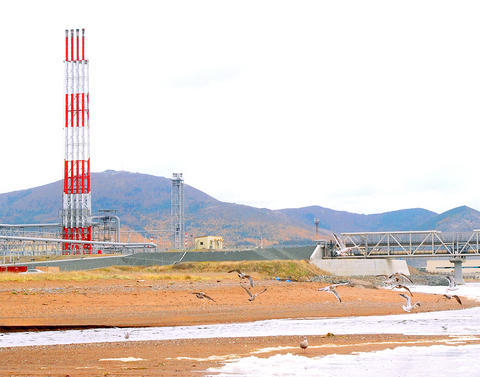In the central square of this once-isolated Russian outpost, Soviet founder Vladimir Lenin's statue is now framed by giant TV advertising screens.
Japanese SUVs stream past restaurants offering European, Indian or Japanese cuisine, packed with diners on weekend nights despite big city prices. Schoolchildren snap pictures of each other on late-model camera phones.
Sakhalin Island, off Russia's Pacific coast, was a prison colony under the czars of the 19th century and a closed-off home to secret air bases during the Cold War. Today, it is enjoying an economic boom driven by high prices for its oil and gas industry.

PHOTO: AP
The Sakhalin Energy international oil and gas consortium, the largest such project on the island and in the world, boasts of pumping US$400 million into the island's infrastructure, including hospitals, roads and aid for indigenous people and the salmon fishing industry. Official unemployment statistics are just above 1 percent, although the actual number is believed to be higher.
Sakhalin's population fell from a high of 710,200 people in 1989, near the end of the Soviet era, to 546,700 in the most recent 2002 census. But locals say the outflow of people has ended and some who left are starting to return.
A visitor's first impression of the island remains typically glum post-Soviet -- a dingy waiting room and only two booths for border police, meaning that passengers flying into Yuzhno-Sakhalinsk, Sakhalin Island's main city, often wait an hour or more to be granted entry.

PHOTO: AP
Yet even there a visitor gets a first hint of the changes. A wall-size signboard from the imposingly named Mega Palace hotel brags of being "the most prestigious and luxurious" accommodation in the city. It's just one of many such establishments that are popping up around Yuzhno-Sakhalinsk, where hordes of foreign workers have driven up prices for rooms at hotels to more than 4,000 rubles (US$163) a night.
Indeed, often the first comment you hear from residents is about the rising cost of living.
For example, the lowest selling price listed for a single-room apartment in a local newspaper is 1.4 million rubles, or US$57,200. It's good news for residents who want to leave and sell their homes, but difficult for people on fixed incomes, such as retirees, or those who want to raise families.
There is also concern about what will happen when the offshore oil and gas platforms, pipelines and other facilities are completed and the construction boom comes to an end.
When regular energy exports begin, it will requiring smaller staffs, with most of the profits going to Moscow and international companies.
"The oil boom is not stable," said Dmitry Litsitsyn, chairman of the activist group Sakhalin Environment Watch.
Yuzhno-Sakhalinsk has come a long way from its 19th century roots.
This city took shape after the Japanese occupied the southern part of the island following the 1905 Russo-Japanese War, building the settlement they called Toyohara -- or "Virgin Valley." The grid street system followed the example of Chicago after its 1871 Great Fire, local historian Igor Samarin said.
The next stage in the city's development came after Japan's defeat in World War II when the Soviets took over the entire island, building the central square with the obligatory Lenin statue and the drab apartment blocks that remain the city's main housing today.
The city has entered a new stage of development in the past two to three years with the oil boom, Samarin said.
Nearly every corner has a store selling mobile phones and new shopping malls stock imported goods like flat-screen TVs and the latest ski equipment. Parks and roads are getting a facelift, and a new gondola is set to ascend to a small ski resort in the mountains framing the city.
An 18-hole golf course is being laid out on the outskirts -- although the heavy winter snows that regularly blanket the island will likely limit time on the links to about half of the year.
"It's just the beginning," Samarin said of the latest stage in Sakhalin's growth. "The Japanese planned the city and the Soviets built it up. The future will be capitalist."
Expatriate workers live in US-style suburban enclaves surrounded by fences for security against threats both human and animal -- namely some 3,000 brown bears that populate the island and can grow to weigh up to 700kg.
The prosperity is shared unevenly. Just next door to the terminus of oil and gas pipelines and Russia's first-ever liquefied natural gas plant, the city of Korsakov is a bleak hamlet where rusting fishing boats lay half-sunken near the shore. Running water flows just twice a day, two hours at a time.
Some hoped that the new homes for workers building the gas plant would be turned over to locals, but Sakhalin Energy instead built its housing right next to the facility -- meaning it must be dismantled because it will be too close for safety when the plant becomes operational next year.
Despite the oil and gas supplies to be exploited here, the island still gets its power from coal-fired generators spewing clouds of haze into the crisp air.
In Yuzhno-Sakhalinsk, 23-year-old photo studio assistant Sergei Chernikh roams around the Lenin statue with his camera. He still dreams of going elsewhere in Russia, worrying what will happen when the oil boom fades.
"We can live another 10 years as long as there is oil," he said. "If there is no oil anymore, the island will die, the foreigners won't be here anymore."

MORE VISITORS: The Tourism Administration said that it is seeing positive prospects in its efforts to expand the tourism market in North America and Europe Taiwan has been ranked as the cheapest place in the world to travel to this year, based on a list recommended by NerdWallet. The San Francisco-based personal finance company said that Taiwan topped the list of 16 nations it chose for budget travelers because US tourists do not need visas and travelers can easily have a good meal for less than US$10. A bus ride in Taipei costs just under US$0.50, while subway rides start at US$0.60, the firm said, adding that public transportation in Taiwan is easy to navigate. The firm also called Taiwan a “food lover’s paradise,” citing inexpensive breakfast stalls

TRADE: A mandatory declaration of origin for manufactured goods bound for the US is to take effect on May 7 to block China from exploiting Taiwan’s trade channels All products manufactured in Taiwan and exported to the US must include a signed declaration of origin starting on May 7, the Bureau of Foreign Trade announced yesterday. US President Donald Trump on April 2 imposed a 32 percent tariff on imports from Taiwan, but one week later announced a 90-day pause on its implementation. However, a universal 10 percent tariff was immediately applied to most imports from around the world. On April 12, the Trump administration further exempted computers, smartphones and semiconductors from the new tariffs. In response, President William Lai’s (賴清德) administration has introduced a series of countermeasures to support affected

CROSS-STRAIT: The vast majority of Taiwanese support maintaining the ‘status quo,’ while concern is rising about Beijing’s influence operations More than eight out of 10 Taiwanese reject Beijing’s “one country, two systems” framework for cross-strait relations, according to a survey released by the Mainland Affairs Council (MAC) on Thursday. The MAC’s latest quarterly survey found that 84.4 percent of respondents opposed Beijing’s “one country, two systems” formula for handling cross-strait relations — a figure consistent with past polling. Over the past three years, opposition to the framework has remained high, ranging from a low of 83.6 percent in April 2023 to a peak of 89.6 percent in April last year. In the most recent poll, 82.5 percent also rejected China’s

PLUGGING HOLES: The amendments would bring the legislation in line with systems found in other countries such as Japan and the US, Legislator Chen Kuan-ting said Democratic Progressive Party (DPP) Legislator Chen Kuan-ting (陳冠廷) has proposed amending national security legislation amid a spate of espionage cases. Potential gaps in security vetting procedures for personnel with access to sensitive information prompted him to propose the amendments, which would introduce changes to Article 14 of the Classified National Security Information Protection Act (國家機密保護法), Chen said yesterday. The proposal, which aims to enhance interagency vetting procedures and reduce the risk of classified information leaks, would establish a comprehensive security clearance system in Taiwan, he said. The amendment would require character and loyalty checks for civil servants and intelligence personnel prior to